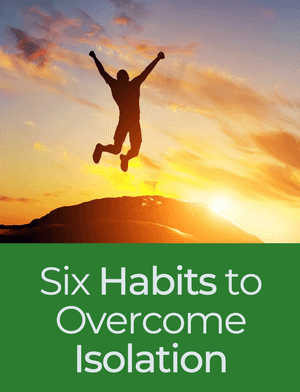
Get the Six Habits for Overcoming Isolation Guide for free


Statistics show more than half of young Americans don't feel close to anyone, and that number has doubled since the 1980s. Part of being human is that we all feel lonely at times. Even the most extroverted people have likely felt the urge to connect and experienced sadness from being unable to interact with someone.
Listen to the podcast version here
Being social is encoded in our genes because, during the process of evolution, it increased our chances of survival. Wanting to belong and having to feel needed is in our nature. We are genetically hardwired to respond to inputs from our environment. When you are thirsty, you drink. When you are hungry, you eat. And when you are lonely, your mind is communicating a desire to connect with others in order to feel safe.
Feeling lonely is perfectly healthy in the short term as it guides you toward the connections you need and crave. But these same feelings can be dangerous in the long run. Studies have shown social isolation can literally kill someone.
While social isolation isn't identical to feeling lonely, a meta-analysis found chronic feelings of loneliness increased the risk of premature death by ~30%, which is the same risk as smoking a pack of cigarettes a day or being medically obese.
Because we evolved to live in groups and depend on one another, being alone makes you more sensitive to threats. Loneliness is directly correlated to how we process threatening information and stimuli in our brain, suggesting that loneliness puts your body in a hyper-vigilant state.
Hyper-vigilance causes an increase in stress hormones and reduces the functioning of your immune system. Social exclusion also activates the same brain regions as hunger and pain. Therefore, loneliness quite literally hurts you.
When you feel lonely, your brain is more susceptible to depressive symptoms, and your ability to self-regulate is decreased. Studies have shown that those who reported chronic feelings of loneliness had a 64% increased chance of developing dementia.
People who are chronically lonely have greater levels of viruses in their systems and are at higher risk of suffering from chronic inflammation, which has been linked to type-2 diabetes, arthritis, heart disease, and even suicide.
To properly address chronic feelings of loneliness, you first need to acknowledge the potential consequences of failing to do so and accept the feelings for what they are: a desire to connect with others.
The most obvious option is to seek social support with members of your family, friends, and community members, such as a church or a meetup group. The only thing that matters is that you feel accepted and supported. Find the courage to completely embrace yourself within a community of people that makes you feel needed.
If you think you lack social support, you could consider providing it instead. Research shows giving support may relieve just as much stress as receiving it and doing so will lay the foundation for future relationships.

Get the Six Habits for Overcoming Isolation Guide for free